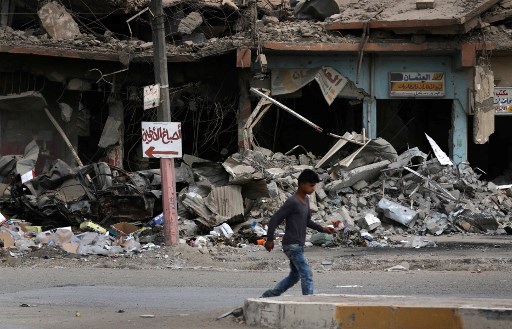Mosul- Near Mosul’s war-ravaged historic heart, Maher Al-Nejmawi watches a worker repainting his long-abandoned stall. Residents of Iraq’s second city are trying to put their lives back together after months of fighting.
“Here, a car bomb exploded. Over there, a rocket hit the building,” says Nejmawi, a 29-year-old car battery and tire salesman dressed in a brown robe.
The white paint on his shop front is still fresh, in contrast with the grey devastation of the surroundings. Rows of stalls lie empty, their metal fronts riddled with bullets.
The streets are strewn with rubble and scrap metal and lined with half-collapsed buildings.
Iraqi Prime Minister Haider al-Abadi on Monday declared Mosul finally retaken from ISIS, which seized the city and swathes of other territory in 2014.
Residents of the Old City in west Mosul, where Iraqi forces cornered the militants in what had been a bastion of their self-proclaimed “caliphate”, are trying to find normality again in a city disfigured by war.
In front of his house, Salem Abdulkhaleq supervises workers laying out breeze blocks ready to rebuild nearby stalls.
“The violence of the air strikes, the explosions of car bombs rocked the houses, which are ancient,” he tells Agence France Presse
“These stalls were damaged. We were afraid that they would collapse, so we knocked them down to rebuild them,” says the 34-year-old father of eight children.
“I’d also like to renovate the interior of my house. The walls and the foundations have been cracked,” he says.
On a shopping street in the Mosul al-Jadida neighbourhood outside the Old City, a foul stench rises from sewage flowing into the gutters that run alongside pavements strewn with rubbish.
But at the feet of the gutted buildings, shops have reopened.
In front of the ice merchant’s store, a large crater reveals twisted pipes.
A little further away, the pavements have been invaded by the tables and the chairs of restaurants, while glistening chickens turn in the rotisseries.
“Before, we couldn’t walk here. There was rubble everywhere. But in the last two months life has gradually gone back towards normality,” says Ahmed Hamed as he sits with friends and prepares for a meal of grilled meat on a restaurant terrace.
The infrastructure in west Mosul, however, has been destroyed, the 49-year-old engineer says.
“Roads, the sewerage system, running water, electricity, there is nothing left,” he says.
“For water there are tanks or organizations that distribute it for free, and for electricity people sign up to use generators in each neighborhood.”
Down the street, municipal workers pour cement into large trenches as they install new sewers.
“We’ve been working for a month in parts of western Mosul that have already been liberated,” Ammar Anwar, a municipal official for waste water treatment, tells AFP.
But the city authorities say they are short of cash.
“The funds we’ve been allocated are low because of the country’s financial situation, but the NGOs will help us,” he says.
On Monday, the United Nations’ refugee agency warned that basic services such as water, electricity and infrastructure including schools and hospitals will need to be rebuilt or repaired.
“Rebuilding is likely to be slow and costly but is essential to achieve stability,” it said.
But in the grocery store where Luay Hazem works, basic goods have reappeared. He is selling pasta, boxes of beans, cartons of eggs, bottles of water and nappies.
“All these products are available now, but it’s more expensive because of the transport,” he says.
He also complains of the damage to infrastructure.
“There is no water, no electricity. You can get electricity by getting connected to a generator, but the prices they charge are higher than those set by the government,” says the 20-year-old, who looks closer to 30.
“ISIS destroyed us,” he says.
